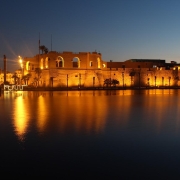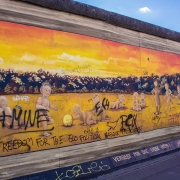What caused the 1948 Arab-Israeli war?
What is the Arab-Israeli conflict?
On 14 May 1948, Israel’s first prime minister, David Ben-Gurion, declared the independence of Israel, which then led to the outbreak of war. Following the termination of the British Mandate, armies belonging to five Arab nations (Jordan, Iraq, Lebanon, Syria and Egypt) formed a military coalition and invaded Israel. Eventually, Israel achieved victory against the Arab forces.
From the Israel’s perspective, the conflict was known as the ‘War of Independence’. In contrast, the displaced Palestinians described the incident as the ‘Nakba‘, also known as ‘Catastrophe’, given the expulsion of more than 50% of the Palestinian Arabs from their homes.
Topic of Study [For H2 History Students]:
Paper 1: Safeguarding International Peace and Security
Section B: Essay Writing
Theme III Chapter 2: Political Effectiveness of the UN in maintaining international peace and security
In the following section, we will examine what are the factors that could have led to the start of this conflict as well as the involvement of the newly-formed United Nations. We will be discussing this topic from the four key roles: United Kingdom, Israel, Arab nations and the United Nations
1. [United Kingdom] Balfour Declaration: Seeds of Disaster
The first contributing factor relates to the United Kingdom’s proposed plans for the British Jewish community in creating a ‘home’ in Palestine. On 2 Nov 1917, British Foreign Secretary Arthur Balfour signed the Balfour Declaration, which stated that:
His Majesty’s government view with favour the establishment in Palestine of a national home for the Jewish people, and will use their best endeavours to facilitate the achievement of this object, it being clearly understood that nothing shall be done which may prejudice the civil and religious rights of existing non-Jewish communities in Palestine, or the rights and political status enjoyed by Jews in any other country.
In short, the Balfour Declaration meant that the Jews were given the promise that a ‘national home’ would be established in the Palestine area, while ensuring the rights of the affected people were protected.
Following the end of World War I, the League of Nations oversaw the creation of Mandatory Palestine, in which the British was granted the right of rule.
However, the British support for the creation of a Jewish home had set the grounds for conflict, as seen by the series of Arab attacks in 1920, 1929 and 1936.
2. [Israel] Zionism: A National Movement
The second consideration for the outbreak of the Arab-Israeli War in 1948 can be traced to the 19th century, in which the founder of the Modern Zionist movement, Theodor Herzl, shared his vision of an independent Jewish state in the 20th century.
Zionism then became the leading national movement that guided the Jewish people to establish a ‘national home’ in Palestine, which they described as the biblical ‘Land of Israel’. As such, the Jewish community pursued the aim of ’emancipation and self-determination’, which were building blocks of statehood.
However, this zealous movement was met with resistance by the Arab nations. In response to the creation of an independent Israel, the five (above-mentioned) Arab countries were guided by their shared religious belief and waged a war.
3. [Arab Nations] Arab Nationalism: A United Front
The third factor involves Arab nationalism, which emerged due to the shared cultural-religions and historical background. The Arab nations held a common perception that the Western powers were more inclined to support Israel, as evidenced by the Balfour Declaration of 1917.
As such, the declaration of Israel’s independence in 1948 served as a pretext for the Arab coalition to fight against a ‘common enemy’ and challenge the Western powers.
4. [United Nations] Partition Plan: Resolution Attempts
Before the 1948 Arab-Israeli conflict began, the United Nations put forward a proposal, known as the Partition Plan for Palestine on 29 Nov 1947. The United Nations General Assembly passed Resolution 181 (II), which was an urgent attempt to resolve the conflict between Zionism and Palestinian nationalism.
The Plan involved the territorial division of Palestine into three areas, namely a Jewish state, Arab state and the ‘City of Jerusalem’ (corpus separatum). Given the shared religious significance of Jerusalem for both the Jewish and Arab people, the third area was to be ‘under a special international regime and shall be administered by the United Nations’.
However, the Partition Plan was rejected by the Arab governments as they claimed the arrangement violated the principles of ‘self-determination’, which was enshrined in the UN Charter. Subsequently, a civil war broke out between the Jews and Arabs in Palestine, lasting approximately five months until Ben-Gurion declared Israel’s independence in 1948.
What was the outcome?
After the 1948 Arab-Israeli War, Israel repelled the Arab coalition forces successfully and occupied about 60% of the area that was supposedly allocated to Palestine Arabs as stated in the UN Partition Plan. Also, the conflict led to the massive exodus of Palestinian Arabs from the area that was subsequently recognized as ‘Israel’. From then on, the Arab-Israeli relations were strained, as the following decades saw the outbreak of similar conflicts, such as the Suez Canal crisis and the Six-Day War.
What can we learn from this case study?
Consider the following questions to understand the incident better:
– Were political arrangements, such as the Partition Plan, doomed to fail?
– How did the 1948 Arab-Israeli conflict affect the political effectiveness of the United Nations in the latter’s conduct of peacekeeping missions till 1991? [to be discussed in class]
The H2 and H1 History Tuition feature online discussion and writing practices to enhance your knowledge application skills. Get useful study notes and clarify your doubts on the subject with the tutor. You can also follow our Telegram Channel to get useful updates.
We have other JC tuition classes, such as JC Math Tuition and JC Chemistry Tuition. For Secondary Tuition, we provide Secondary English Tuition, Secondary Math tuition, Secondary Chemistry Tuition, Social Studies Tuition, Geography, History Tuition and Secondary Economics Tuition. For Primary Tuition, we have Primary English, Math and Science Tuition. Call 9658 5789 to find out more.











